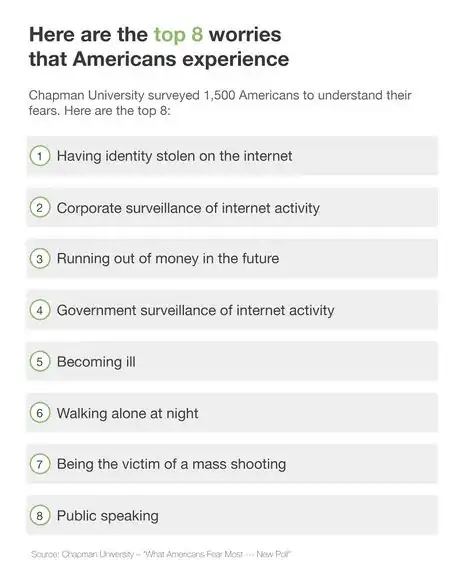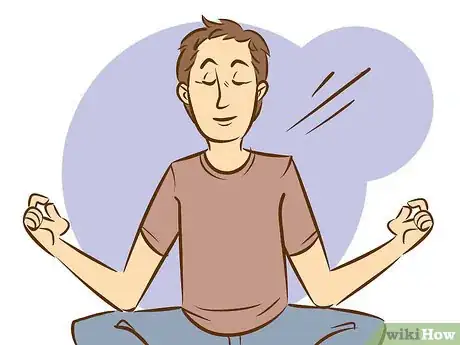This article was co-authored by Liana Georgoulis, PsyD. Dr. Liana Georgoulis is a Licensed Clinical Psychologist with over 10 years of experience, and is now the Clinical Director at Coast Psychological Services in Los Angeles, California. She received her Doctor of Psychology from Pepperdine University in 2009. Her practice provides cognitive behavioral therapy and other evidence-based therapies for adolescents, adults, and couples.
There are 20 references cited in this article, which can be found at the bottom of the page.
wikiHow marks an article as reader-approved once it receives enough positive feedback. This article has 11 testimonials from our readers, earning it our reader-approved status.
This article has been viewed 129,118 times.
Nearly everyone worries sometimes. But, worrying too much can get in the way of living a happy life. It can make it harder to sleep, and distract you from positive things in your life. Worrying can even make it harder to deal with the problems you are worrying about. Worse still, some research shows that too much worrying can even lead to physical health problems.[1] Constant worrying is a habit that can be hard to break. The good news is, there are many things you can do to stop the pattern of excess worry and live a happier life.
Steps
Changing your Behaviors
-
1Postpone worrying. If worrying is interfering with your day-to-day life and you can't stop, try putting off your worries until later. Give yourself permission to worry, but only during certain times of the day.[2]
- For example, you might set aside a half an hour after dinner each day for worrying. If a worry pops into your head at any other time, you can recognize it, but just tell yourself "I'll think about that later."[3]
- This technique lets you set your worries aside for awhile so you can get through your day.
-
2Write your worries down. A study from the University of Chicago shows that writing your worries down can help you let go of them.[4] Writing your worries down can help make the problem feel more manageable.
- This strategy works well with postponing your worries. Making note of them on the list can help you feel like you can let your worries go until "worry time." Then, when it is worry time, you can just go over your list.[5]
Advertisement -
3Talk about your worries. Talking through your worries can also help. It can put things in perspective and help you get to the root of your issues.[6]
- Be aware though that too much of this can be hard for your friends. If this is an ongoing issue, consider seeing a counselor or other mental health professional.
-
4Spend less time on the computer. Recent studies have shown that people who rely on computers and other devices for social interaction suffer from more anxiety. Consider cutting down on your screen time to help with excess worrying.[7]
- Social media use in particular may lead to conflict, and comparison of yourself with others. It can also make it harder to relax. All this can promote worry.
- Switching off your devices several times a day can give you more control over your relationship with technology.
-
5Keep your hands busy. Doing something with your hands, such as knitting or using "worry beads" may help reduce stress and worry.[8] Recent studies by the Medical Research Council show that keeping your hands busy during troubling events may reduce how much they bother you later.[9]
- The research has not discovered any impact on worries about things that have already happened. But, if you are in a troubling situation, do something patterned and repetitive with your hands. It might reduce worries about it later.[10]
-
6Get plenty of exercise. Exercising is not just good for your body. It is also an effective way to decrease the anxiety that leads to worry. Regular exercise may be more effective than prescription drugs for decreasing your anxiety levels.[11]
- Research on animals shows that exercise increases levels of serotonin. This is a brain chemical that relieves anxiety and makes you feel happier.[12]
-
7Take deep breaths. Taking slow deep breaths activates the vagus nerve, which can help reduce stress and worry.
- Some people recommend taking "4-7-8" breaths when worried. To do this, exhale completely through your mouth. Then, inhale through your nose, counting to four as you do so. Hold your breath for seven seconds. Finally, exhale through your mouth, counting to eight as you do so.[13]
-
8Try meditation. Medical research shows that meditating affects the brain in ways that decrease worrying. If you are a persistent worrier learning how to meditate may be very helpful.
- Meditation increases activity in the Ventromedial prefrontal cortex, the part of the brain that controls worrying.[14] It also grounds you in the present moment. Meditation, done right, should make it impossible to think about future problems, at least while you are meditating.
-
9Try aromatherapy. Recent medical studies support the claim that the scents of certain essential oils can reduce stress and worry. In particular, the smell of grapefruit was shown to be effective in this area.[15]
- Essential oils and other aromatherapy products are available in many health stores and natural food shops. You can also try just smelling a grapefruit!
Changing your Thinking
-
1Recognize your worries and move on. Sometimes, trying to suppress your worries seems to just make them worse. So, don't try to ignore your worries. When they pop into your head, accept them, but then try to move on.[16]
-
2Categorize and challenge your worries. When you do think about your worries, a good way to process them is to categorize them. Specifically, for each try to determine the following:
- Is this problem one you can solve, or not? If a worry is about a problem you have the power to fix, the best remedy may be to start fixing it. Once you have a plan to fix the problem, you will be less worried. If you cannot solve the problem, accept it, work through it and move on. [19]
- Is this worry about something that is likely, or unlikely, to happen? A worry about something that is likely to happen may indeed be troubling. On the other hand, if you decide it is not likely to occur, this can be a first step in letting that worry go.[20]
- Is this worry about something about something really bad, or not? Think about what it is that you are worried might happen. If it did occur, how bad would it really be? Most things we worry about aren't actually that terrible. If you decide it wouldn't be a catastrophe, this can help you let go. That's doubly true if it also isn't that likely to happen![21]
-
3Make your worries boring. If there is a specific worry that bothers you often, you can try to make it boring, so your brain will return to it less often. Do this by repeating it in your head again and again for several minutes.[22]
- For example, if you worry that you might get in a car accident, repeat in your head the words "I might get in a car accident, I might get in a car accident." In the short term, this may increase you anxiety. But, after a little while, the words will lose their power and become boring to you. Chances are, they'll stop popping up in your mind so often after that.
-
4Accept uncertainty and imperfection. An important change in your thinking is accepting that life is unpredictable and imperfect. This is key to stopping worries in the long term. A good place to start this change is with a writing exercise. Jot down your answers to these questions:[23]
- Is it possible to be certain about everything that might happen?
- In what way is needing certainty helpful to you?
- Do you tend to predict bad things will happen just because you are uncertain? Is that reasonable?
- Can you live with the possibility that a bad thing might happen, if that outcome is not likely?
- When worries come to mind, try to remind yourself of your answers to these questions.
-
5Think about social influences. Emotions can be contagious. If you spend a lot of time with other worriers, or people who make you anxious, you may want to reconsider how much time you are spending with those people.[24]
- Spend some time thinking about the people you spend time with, and how they affect you. It may even be helpful to keep a "worry diary" that tracks when you worry most. If you find that it's right after seeing a certain person, you may decided you need to spend less time with him or her. Or, you might decide there are certain topics you don't wish to discuss with this person any more.
- Changing your social circle can change the way you think.
-
6Live in the moment. Most worries rise from fears about the future, rather than our immediate surroundings. Focusing on you surroundings and the moment you are experiencing can be a good way to shut down worries.[25]
- Some people recommend a "stop, look, listen" technique. In this approach, when you are worrying, stop and recognize the worry. Take a deep breath. Then, look at your surroundings. Spend five minutes focusing on the details of the world around you. As you do so, speak calmly and reassure yourself that things will work out.
Expert Q&A
-
QuestionIs it okay to worry?
 Liana Georgoulis, PsyDDr. Liana Georgoulis is a Licensed Clinical Psychologist with over 10 years of experience, and is now the Clinical Director at Coast Psychological Services in Los Angeles, California. She received her Doctor of Psychology from Pepperdine University in 2009. Her practice provides cognitive behavioral therapy and other evidence-based therapies for adolescents, adults, and couples.
Liana Georgoulis, PsyDDr. Liana Georgoulis is a Licensed Clinical Psychologist with over 10 years of experience, and is now the Clinical Director at Coast Psychological Services in Los Angeles, California. She received her Doctor of Psychology from Pepperdine University in 2009. Her practice provides cognitive behavioral therapy and other evidence-based therapies for adolescents, adults, and couples.
Licensed Psychologist It is perfectly natural and normal to worry about things. This is just a part of experiencing human emotions! The only problem is if your worrying gets in the way of you living your life. If you find it extremely difficult to relax or you start worrying about things entirely out of your control, it may be time to seek professional help.
It is perfectly natural and normal to worry about things. This is just a part of experiencing human emotions! The only problem is if your worrying gets in the way of you living your life. If you find it extremely difficult to relax or you start worrying about things entirely out of your control, it may be time to seek professional help. -
QuestionWhy is it so hard for me to calm down and start worrying?
 Rebekka MarsRebekka Mars is a Life, Meditation, and Yoga Coach as well as the Founder of Modern Meditation™. She's located in Sarasota, Florida and also works online with people all around the world. With over ten years of experience, Rebekka specializes in Yoga, meditation, and personal training to help clients embrace their body, mind, and soul to find calmness and balance in everyday life. She holds a BA in English from Lindenwood University and has over 1000 hours of Yoga training, holding her ERYT500 certification. Rebekka also serves as a keynote speaker on the topic of modern mindfulness speaking in person and virtually.
Rebekka MarsRebekka Mars is a Life, Meditation, and Yoga Coach as well as the Founder of Modern Meditation™. She's located in Sarasota, Florida and also works online with people all around the world. With over ten years of experience, Rebekka specializes in Yoga, meditation, and personal training to help clients embrace their body, mind, and soul to find calmness and balance in everyday life. She holds a BA in English from Lindenwood University and has over 1000 hours of Yoga training, holding her ERYT500 certification. Rebekka also serves as a keynote speaker on the topic of modern mindfulness speaking in person and virtually.
Meditation & Yoga Coach A lot of times, this just comes down to a shift in perspective. If you can get away from picturing the worst-case scenario, you're going to have a much easier time relaxing. Try to start pretending like the best outcome is happening right now, even if deep down you don't believe it. Eventually, you'll start having an easier time reframing things.
A lot of times, this just comes down to a shift in perspective. If you can get away from picturing the worst-case scenario, you're going to have a much easier time relaxing. Try to start pretending like the best outcome is happening right now, even if deep down you don't believe it. Eventually, you'll start having an easier time reframing things. -
QuestionHow do I train my brain to stop worrying?
 Liana Georgoulis, PsyDDr. Liana Georgoulis is a Licensed Clinical Psychologist with over 10 years of experience, and is now the Clinical Director at Coast Psychological Services in Los Angeles, California. She received her Doctor of Psychology from Pepperdine University in 2009. Her practice provides cognitive behavioral therapy and other evidence-based therapies for adolescents, adults, and couples.
Liana Georgoulis, PsyDDr. Liana Georgoulis is a Licensed Clinical Psychologist with over 10 years of experience, and is now the Clinical Director at Coast Psychological Services in Los Angeles, California. She received her Doctor of Psychology from Pepperdine University in 2009. Her practice provides cognitive behavioral therapy and other evidence-based therapies for adolescents, adults, and couples.
Licensed Psychologist As your worries arise, challenge them in a rational way. Ask yourself what evidence you have that your worry is a realistic one. Think about what you might tell a friend who had the same worry. Try to imagine the most likely outcome, rather than the worst-case scenario
As your worries arise, challenge them in a rational way. Ask yourself what evidence you have that your worry is a realistic one. Think about what you might tell a friend who had the same worry. Try to imagine the most likely outcome, rather than the worst-case scenario
Warnings
References
- ↑ https://www.nimh.nih.gov/health/topics/anxiety-disorders
- ↑ https://www.cci.health.wa.gov.au/~/media/CCI/Mental-Health-Professionals/Generalised-Anxiety/Generalised-Anxiety---Information-Sheets/Generalised-Anxiety-Information-Sheet---05---Postpone-your-Worry.pdf
- ↑ https://www.studenthealthatshu.co.uk/website/C88007/files/The%20Worry%20Time%20Technique.pdf
- ↑ http://news.uchicago.edu/article/2011/01/13/writing-about-worries-eases-anxiety-and-improves-test-performance
- ↑ http://www.helpguide.org/articles/anxiety/how-to-stop-worrying.htm
- ↑ https://www.betterhealth.vic.gov.au/health/healthyliving/talking-through-problems
- ↑ http://www.huffingtonpost.com/2013/10/01/stop-worrying-anxiety-cycle_n_4002914.html
- ↑ http://www.fastcompany.com/3040809/how-to-be-a-success-at-everything/7-surprising-things-that-can-help-you-stop-worrying
- ↑ http://www.apa.org/news/press/releases/2004/03/trauma-memory.aspx
- ↑ http://www.huffingtonpost.com/2013/10/01/stop-worrying-anxiety-cycle_n_4002914.html
- ↑ Liana Georgoulis, PsyD. Licensed Psychologist. Expert Interview. 6 September 2018.
- ↑ http://well.blogs.nytimes.com/2009/11/18/phys-ed-why-exercise-makes-you-less-anxious/
- ↑ https://psychcentral.com/anxiety/why-deep-breathing-helps-calm-anxiety
- ↑ http://scan.oxfordjournals.org/content/early/2013/06/03/scan.nst041
- ↑ http://www.fastcompany.com/3040809/how-to-be-a-success-at-everything/7-surprising-things-that-can-help-you-stop-worrying
- ↑ http://www.huffingtonpost.com/2013/10/01/stop-worrying-anxiety-cycle_n_4002914.html
- ↑ http://www.sciencedirect.com/science/article/pii/S0005796704000853
- ↑ http://www.helpguide.org/articles/anxiety/how-to-stop-worrying.htm
- ↑ https://patient.info/news-and-features/how-to-stop-worrying-about-things-you-cant-change
- ↑ https://www.psychologytoday.com/blog/insight-therapy/201501/how-stop-worrying-and-get-your-life
- ↑ https://www.psychologytoday.com/blog/insight-therapy/201501/how-stop-worrying-and-get-your-life
- ↑ https://www.psychiatrictimes.com/view/exposure-therapy-anxiety-disorders
- ↑ http://www.helpguide.org/articles/anxiety/how-to-stop-worrying.htm
- ↑ http://www.helpguide.org/articles/anxiety/how-to-stop-worrying.htm
- ↑ https://www.psychologytoday.com/us/blog/compassion-matters/201807/5-truths-about-anxiety-help-you-stay-present
- ↑ http://pubs.acs.org/doi/abs/10.1021/pr900607v?tokenDomain=presspac&tokenAccess=presspac&forwardService=showFullText&journalCode=jprobs&
- ↑ http://pubs.acs.org/doi/abs/10.1021/pr900607v?tokenDomain=presspac&tokenAccess=presspac&forwardService=showFullText&journalCode=jprobs&
- ↑ Liana Georgoulis, PsyD. Licensed Psychologist. Expert Interview. 6 September 2018.
- ↑ http://www.nimh.nih.gov/health/publications/generalized-anxiety-disorder-gad/index.shtml
About This Article
If you want to stop worrying, get into a habit of questioning your worry thoughts so you can divide them into things you can do something about and things you have no control over and can let go of. Whenever a worry thought pops into your head, ask yourself: “Is this a problem I can solve or not?”. If you can do something about it, like mending a hole in your sock before it gets bigger, plan what you’ll do and start fixing it. If not, then accept it as a thought but let it go. You can also ask yourself how likely or unlikely something is going to happen, to help yourself stay realistic instead of thinking of worst-case scenarios. Even if you think it’s bad, remind yourself you can prepare instead of worry, for action trumps thoughts. For more advice from our Counselor co-author, including how to accept uncertainty, read on!










































































Medical Disclaimer
The content of this article is not intended to be a substitute for professional medical advice, examination, diagnosis, or treatment. You should always contact your doctor or other qualified healthcare professional before starting, changing, or stopping any kind of health treatment.
Read More...